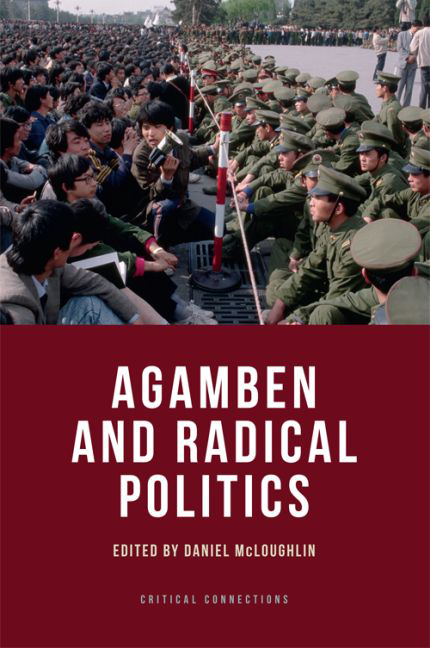Book contents
- Frontmatter
- Contents
- Acknowledgements
- Introduction: Agamben and Radical Politics
- 1 Capitalism as Religion
- 2 Glory, Spectacle and Inoperativity: Agamben's Praxis of Theoria
- 3 On Property and the Philosophy of Poverty: Agamben and Anarchism
- 4 ‘Man Produces Universally’: Praxis and Production in Agamben and Marx
- 5 Liturgical Labour: Agamben on the Post-Fordist Spectacle
- 6 An Alogical Space of Genetic Reintrication: Notes on an Element of Giorgio Agamben's Method
- 7 Zoē aiōniōs: Giorgio Agamben and the Critique of Katechontic Time
- 8 Agamben, Badiou and Affirmative Biopolitics
- 9 Form-of-Life and Antagonism: On Homo Sacer and Operaismo
- 10 What Is a Form-of-Life?: Giorgio Agamben and the Practice of Poverty
- 11 Law and Life beyond Incorporation: Agamben, Highest Poverty and the Papal Legal Revolution
- Notes on Contributors
- Index
6 - An Alogical Space of Genetic Reintrication: Notes on an Element of Giorgio Agamben's Method
Published online by Cambridge University Press: 23 September 2017
- Frontmatter
- Contents
- Acknowledgements
- Introduction: Agamben and Radical Politics
- 1 Capitalism as Religion
- 2 Glory, Spectacle and Inoperativity: Agamben's Praxis of Theoria
- 3 On Property and the Philosophy of Poverty: Agamben and Anarchism
- 4 ‘Man Produces Universally’: Praxis and Production in Agamben and Marx
- 5 Liturgical Labour: Agamben on the Post-Fordist Spectacle
- 6 An Alogical Space of Genetic Reintrication: Notes on an Element of Giorgio Agamben's Method
- 7 Zoē aiōniōs: Giorgio Agamben and the Critique of Katechontic Time
- 8 Agamben, Badiou and Affirmative Biopolitics
- 9 Form-of-Life and Antagonism: On Homo Sacer and Operaismo
- 10 What Is a Form-of-Life?: Giorgio Agamben and the Practice of Poverty
- 11 Law and Life beyond Incorporation: Agamben, Highest Poverty and the Papal Legal Revolution
- Notes on Contributors
- Index
Summary
The Heavenly Circuit: Berenice's Hair;
Tent-pole of Eden; the tent's drapery;
Symbolical glory of the earth and air!
The Father and His angelic hierarchy
That made the magnitude and glory there
Stood in the circuit of a needle's eye.
Some found a different pole, and where it stood
A pattern on a napkin dipped in blood.
W. B. Yeats, ‘Veronica's Napkin’In an extraordinary recent encounter, the French thinkers Alain Badiou and Jean-Claude Milner divide strenuously over the sense of contemporary political action. For Milner, we must now recognise that ‘the heart of the question of politics’ is ‘the issue of bodies and their survival’. Accepting this ‘hard kernel’ of the political entails that we adopt a sceptical position vis-à-vis political action, in which a certain kind of pragmatism should order our actions. For Badiou, by contrast, such a position is tantamount to an abandonment of political militancy as such. As is well known, he instead proposes a reconstruction of ‘the communist hypothesis’, that is, that politics must be undertaken as a situated local struggle to correlate equality and freedom at the level of the community. Hence Badiou can assert ‘Politics is the real of communism.’ Their exchange is all the more salutary in that, in its very sharpness, it brings out certain limits and positional constraints of political thinking today. On the one hand, Milner offers a kind of disenchanted minimalist dialectic in which the survival of communities becomes the extimate kernel of the political. Contingencies affecting the natural substrate of humanity – such as plagues, earthquakes, environmental catastrophes, and so on – both found and threaten the political, in such a way as to render all utopian propositions both unduly local and essentially delusory. For its part, the state, through its monopoly on violence, at once opens a space for genuine politics that is based not on killing but on confrontations of discourse, yet thereby operates as an anti-political power.
By contrast, Badiou attempts to identify and affirm what remains today of the great modern revolutionary programmes as the ‘communist hypothesis’ – which can only be a ‘hypothesis’ precisely because the motif of revolution that governed modernity is now ruined. As he elsewhere writes: ‘We don't know today what a revolution or the figure of the State corresponding to this could be.’
- Type
- Chapter
- Information
- Agamben and Radical Politics , pp. 115 - 140Publisher: Edinburgh University PressPrint publication year: 2016



